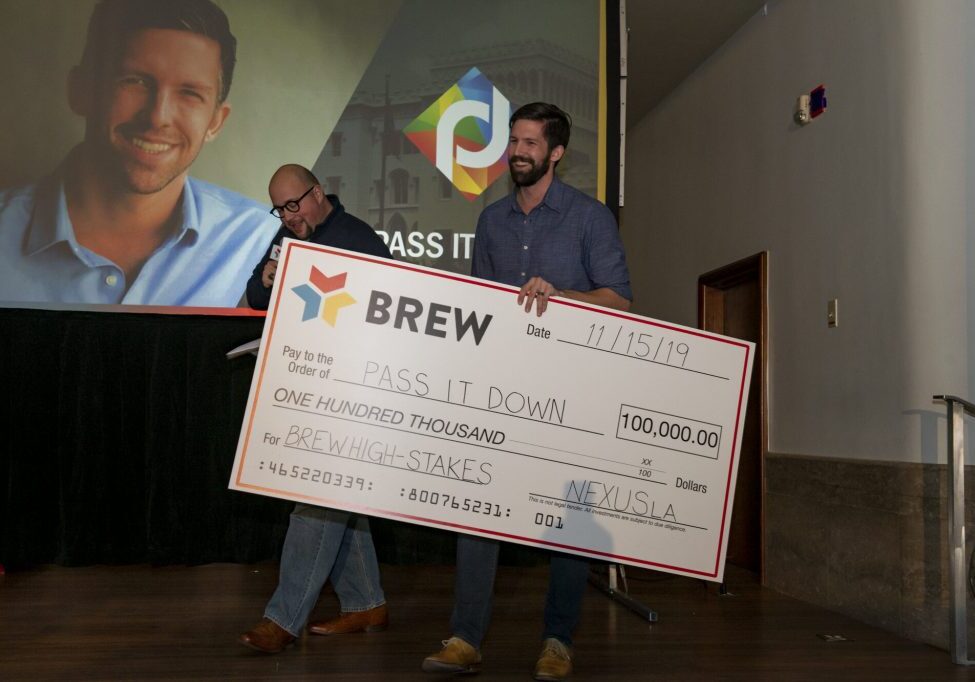As an entrepreneur, one of the most important business decisions you’ll make is identifying your audience and business model. Many startups tend to orient themselves as business-to-business or business-to-consumer, but those aren’t the only ways to think about your organization
You can also choose to become a federal contractor, franchise owner, or nonprofit founder. Each has a different business model and strategic approach. At 2023’s Baton Rouge Entrepreneurship Week (BREW), speakers experienced in these areas shared their expertise on what makes these business models great.
Learn what you need to know before getting started.
Becoming a Federal Contractor
Becoming a federal contractor can be a lucrative and rewarding experience for entrepreneurs, as you compete for contracts to provide goods and services to various parts of the federal government, including agencies and the military.
King Crow Studios, based in Baton Rouge, was awarded a $6.5 million Small Business Innovation Research (SBIR) Phase III contract in 2021 to support the U.S. Air Force’s B-52 pilot training over the next four years. The contract followed the company’s collaborative efforts with the Air Force to develop a virtual reality-based trainer.
King Crow Studios is just one example of how a startup or small business can access federal contracts. Here are three big things to know about becoming a federal contractor.
Get Registered and Certified
Before you can sell goods and services to the government, your business needs a unique entity identifier (UEI), which is a 12-character alphanumeric value. You’ll receive your UEI when you register with the System for Award Management (SAM).
When you register for SAM, you can certify eligibility for various types of contracts, including those for small businesses. These include:
- 8(a) Business Development program: Focused on small businesses owned and operated by socially and economically disadvantaged individuals.
- Women-Owned Small Business Federal Contract program: Focused on creating contract opportunities for small businesses owned by women.
- Veteran Small Business Certification program: Focused on creating federal contract opportunities for veteran-owned small businesses.
Once you’ve registered your business, you’ll need to match your products and services to a North American Industry Classification System (NAICS) code. You’ll have a primary NAICS code to identify your business and potentially multiple codes depending on your mix of products and services.
Meet the Size Qualifications
Small businesses looking to become federal contractors must meet the business size parameters, which include a business’ affiliates. Size limits are set by the Small Business Association (SBA) and correspond to NAICS codes.
Some types of companies will be held to annual revenue requirements, while others will be judged based on average number of employees.
Understand Regulatory Requirements
Becoming a federal contractor makes you subject to a variety of additional regulations and laws. These cover areas including hiring, sourcing and subcontracting, as well as whether you qualify as a small business.
Cybersecurity is another key area for federal contractors, as well as an example of how the Department of Defense can have additional requirements for would-be contractors. Project Spectrum specifically addresses cybersecurity issues for small businesses.
Starting a Franchise
Franchises are a type of business organization controlled by a franchisor, which typically has established both a brand and a business system. From there, the franchisor can grant a license to a franchisee to offer goods or services in a particular area in exchange for royalties (and usually certain fees). Well-known franchising opportunities include McDonald’s and UPS.
Starting a franchise is a powerful way for entrepreneurs to get into business with the backing of a powerful brand reputation. “[Franchises] have the experience. They know what works. They know marketing, the simplicity, the initial training and ongoing support,” says Bob Breaux, a certified franchise consultant and founder of FranNet.
While franchising isn’t for everyone, it can be a powerful way to make a living without having to build every aspect of the business from scratch.
“If you pick a franchise that is a great fit for you, it is that vehicle that can get you to your destination while meeting your lifestyle and financial goals,” Breaux says.
Here’s what you need to know about getting started.
Learn About the Franchisor
There are five main categories of franchise, each of which has distinct characteristics and is particularly popular for certain industries or products. As you inquire about a franchise opportunity, ask for the franchise disclosure document (FDD). This document contains key information including business structure, the franchise’s history of operation, litigation and bankruptcies (if any), and much more. You shouldn’t be asked to sign any agreements until well after you’ve received an FDD and examined it closely.
Identify the Total Investment
The FDD will also include franchise fees and capital requirements, which vary by franchisor. For example, if you are looking to open a UPS store, your estimated startup costs will be in six figures, although this varies based on the type of store and geographical location. You’ll need at least $75,000 in liquid assets, too.
If you are interested in opening a Wendy’s, however, you’ll need a net worth of at least $1 million in addition to $500,000 or more in liquid assets. Getting started requires paying multiple fees, including a $50,000 franchise fee with a 20-year term.
You’ll also factor in a variety of other costs, depending on your franchise type, including operating expenses, labor, leasing and insurance.
Understand Franchisor and Franchisee Responsibilities
As a first-time franchisee, you want to ensure that you are getting a fair deal and resources to be successful. “When we’re consulting with people buying a franchise, we always recommend lawyers. We ask them to get the contract, make sure that [the lawyer] reads that carefully,” Breaux says.
You need to know your franchise’s territory, the corporate contact, what franchises are in your area and more. Your FDD should also show everyone else who has a franchise in your network. Use this resource wisely, Breaux says. You can connect with these fellow franchise owners, understand what the day to day is like and how the franchisor typically interacts with franchisees.
Opening a Nonprofit
Opening a nonprofit is an ambitious and rewarding venture for mission-minded entrepreneurs. The major difference between a nonprofit and a for-profit organization is that a nonprofit’s mission is to advance a cause and serve as a public benefit. We typically think of nonprofits as tax-exempt under the IRS, often with the 501(c)(3) designation.
Starting a nonprofit offers a unique blend of purpose, passion, and potential for growth. But how do you get started?
Define Your Nonprofit
You can operate a for-profit business and a nonprofit, but you must separate them. “You have to say, ‘what is my goal for my nonprofit?’ ‘What mission do I want to fulfill in the community with my nonprofit,’” says Jason Hughes, founder of Project 70805.
Hughes’ nonprofit supports social and economic growth in the North Baton Rouge area. Hughes is a longtime entrepreneur who wanted to do more than just run a for-profit enterprise.
“I had a company and the community supported that company. So I felt that it was important to turn around and support the community,” Hughes says.
You can also convert a company into a nonprofit, as Power Pump Girls co-founders Sherin Dawud and Raina Vallot did.
Power Pump Girls started as a for-profit company for professional women to create, collaborate and connect across industries. In 2018, Dawud and Vallot added nonprofit programming, later making the company a 501(c)(3) organization.
Diversify Your Funding
A nonprofit’s success requires funding, which is often obtained through grants, donations or fundraising. The funding you bring in must cover your costs as well as your good work.
“You really need to know the ins and outs of your costs, because it’s one thing to go out there and say, oh, I need $100,000 to fund this program, and then the grantor comes back to you, and it’s like, ‘Can you send me your program budget?’” Dawud says.
As you organize your nonprofit financing strategy, keep in mind that diversification of funding is a good way to guard against financial surprises.
Fundraising is effective, but storytelling can generate ongoing interest and donations from people you wouldn’t otherwise know about, Hughes says: “You’re giving scholarships to teens. I want to do the same thing. Here’s $5,000.”
You don’t have to be a lone hero — ask people to help you. “Your network is your net worth,” says Vallot.
Hughes echoes this sentiment. “The best nonprofits in the world, they function on asking for help: Donate here, give this, give that,” he says. “And the thing that you have to understand is that whatever mission that you guys have, you have to identify who is who.”
Build an Effective Board
The first question Hughes says you should ask a potential board member is, “What does the nonprofit’s mission mean to you?” You want people who are passionate about your purpose and who can help you with fundraising, increasing your brand profile and other key activities. Someone who’s there out of obligation, perhaps because they’re a family member, isn’t the ideal fit.
“Your board is the most crucial piece in terms of that growth trajectory and the sustainability of your company,” Vallot says.
Start Your Business Ownership Journey
Entrepreneurship is your chance to make your mark on the world, especially with so many types of business organizations available. Whether you’re a federal contractor, franchisee, nonprofit or for-profit business, one thing is always true: You don’t have to go it alone. Look to organizations such as Nexus Louisiana, whose mission is to accelerate the growth of high-potential technology-enabled companies by providing them with coaching, capital and connections.



